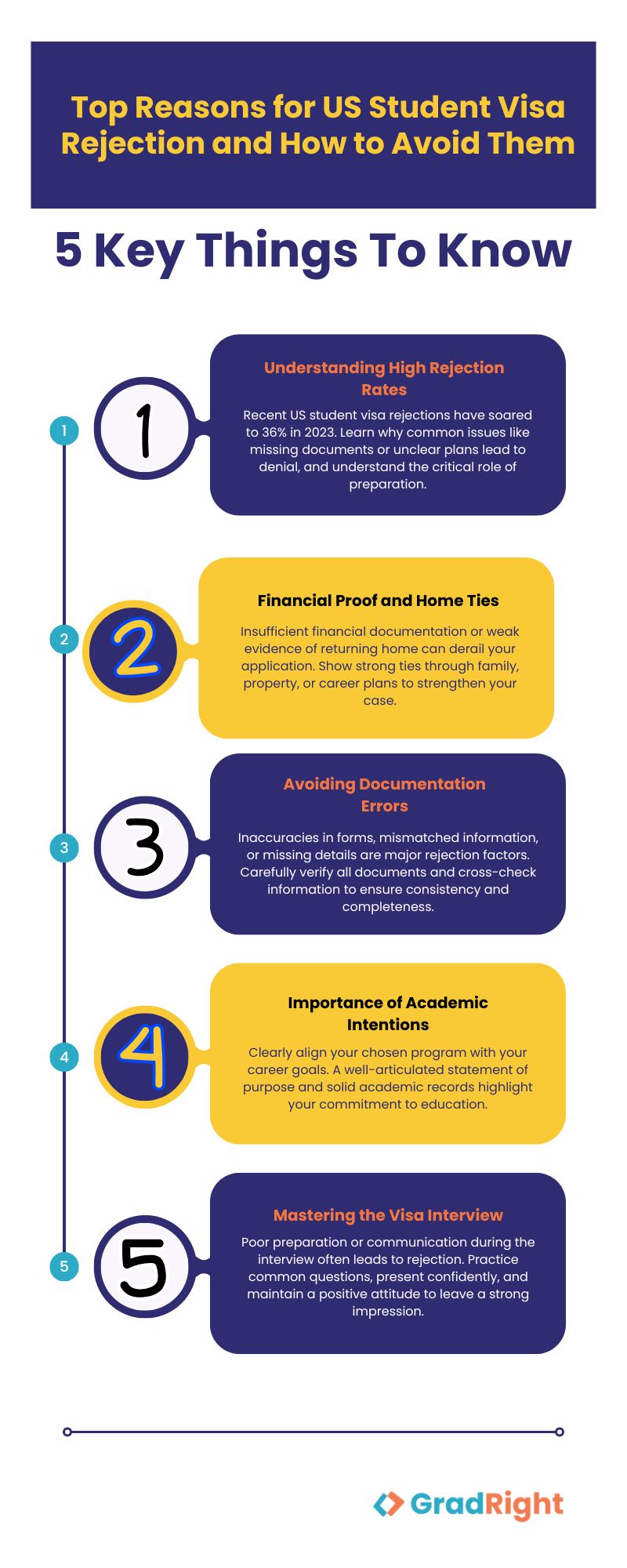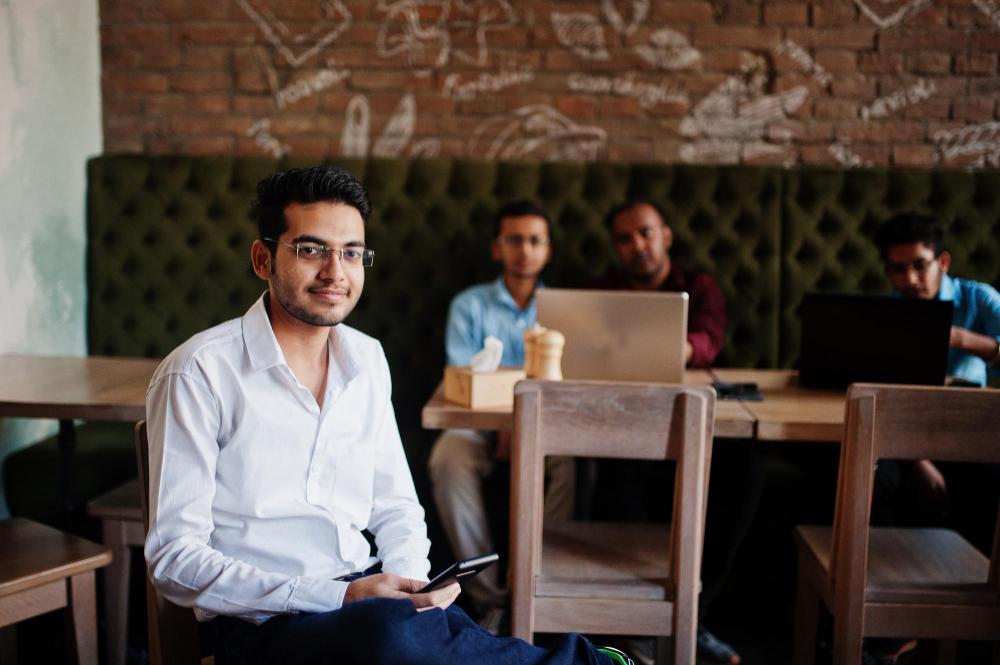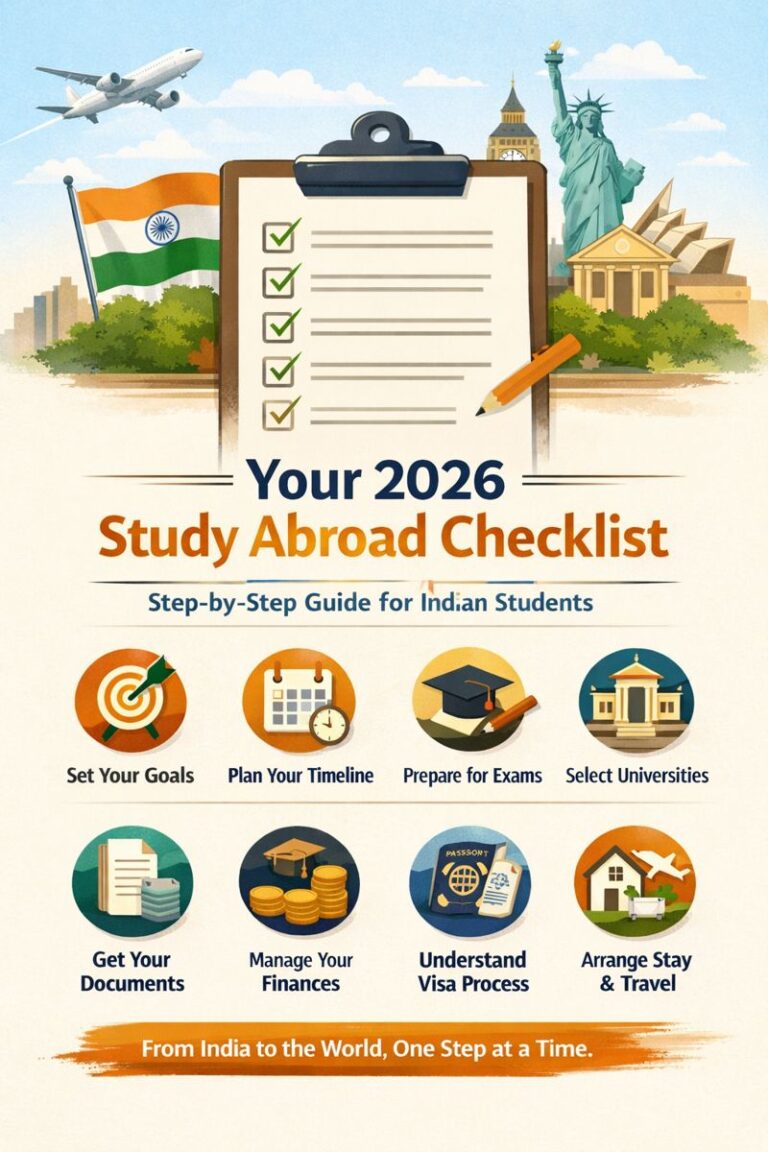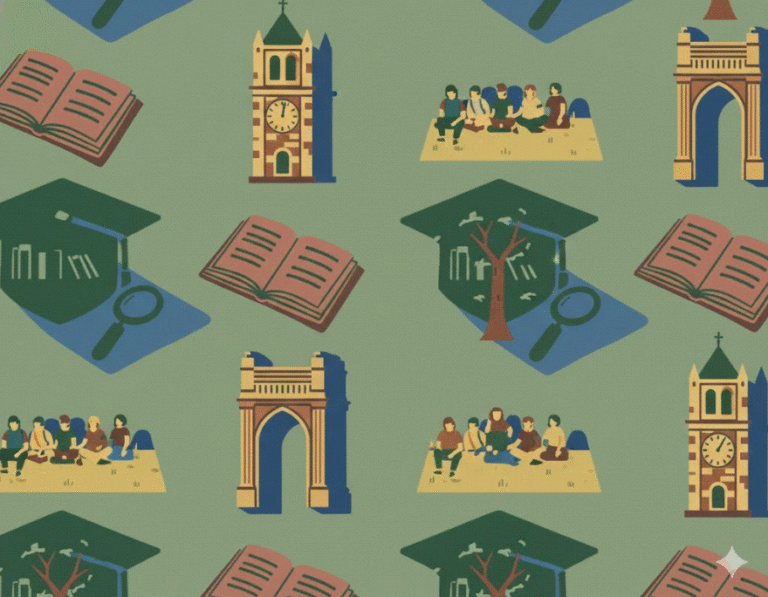Top Reasons for USA Student Visa Rejection: Common Pitfalls and How to Avoid Them
Thousands of students worldwide dream of studying in the USA, but obtaining an F-1, J-1, or M-1 visa can be a huge challenge for many. Rejections are quite common and often due to avoidable errors in the application.
In this article, we explore the principal reasons why US student visas are rejected and offer insights into how to prevent them from happening again.

What is the USA student visa rejection rate?
The rejection rate for US student visas has been quite high in recent years. In 2023, the rejection rate reached 36%, with over 253,355 applications being denied. This is a significant increase compared to previous years.
The high rejection rate is due to multiple factors such as:
- Inaccurate application data
- Insufficient English proficiency
- Long study gaps
- Unclear post-graduation plans
A large number of Indian visa applicants are denied entry since they are unable to prove that they want to return home after getting their degree.
So, make no mistakes: navigating the US student visa process can be overwhelming.
But visa preparation is just one part of your study abroad journey. Along the way, you’ll also face other key challenges, like:
- Securing an education loan with favorable terms.
- Arranging accommodation near your university.
- Understanding and obtaining the right medical insurance.
- Managing financial documentation for your visa application.
FundRight simplifies all of this. From one platform, you can access guidance and resources to tackle these hurdles with confidence. Our experts will walk you through every step, ensuring that nothing is left to chance.
Talk to a FundRight expert today and stay ahead in your study abroad plans.
Now, let’s look at the top 12 reasons for US student visa rejection and how to avoid them.
Top 12 reasons for US student visa rejection
There exists a multitude of factors that can lead to the rejection of a US student visa application. Each case is unique, but certain common reasons have emerged. Understanding these can help applicants apply with greater confidence.
- Insufficient Proof of Financial Resources
To study in the USA you have to show proof of funds. This usually includes:
- Tuition fee
- Accommodation and living expenses
- Health insurance
- Miscellaneous expenses
For most students, this amount is between $60,000 and $100,000 (Ivy League universities are quite expensive). You don’t have to show actual bank balance but proof of scholarship, line of credit, bank guarantees, financial aid letters, etc.
Without adequate documentation about your solvency, it will be difficult to receive a student visa.
- Failure to Demonstrate Ties to Home Country
US student visas are non-immigrant visas and you are expected to return after study. A lack of convincing evidence of ties, such as family connections, property ownership, or a clear career plan can lead to US student visa rejection.
- Incomplete or Inaccurate Application Forms
Errors or omissions in visa application forms can lead to your US student visa application being rejected. Incomplete forms and discrepancies in information are frowned upon. Carefully review the application and submit it after you are fully satisfied that every detail you have offered can be backed up by adequate documentation.
- Lack of Clarity in Academic Intentions
A large part of the US student visa application demonstrates how the degree aligns with career goals. Vague and inconsistent explanations can raise doubt about the genuineness of your intent. You must write a well-structured Statement of Purpose that clearly outlines your background and what you hope to achieve by studying in the USA.
- Previous Immigration Violations
If you have a history of overstaying or other doubtful records such as deportation, or unauthorized employment in the USA, it can lead to your visa being rejected. Even if you have been deported back from another country that would raise doubts about your application.
- Inadequate Preparation for the Visa Interview
The visa interview is all important and poor communication skills can instantly kill your application. Approach the interview with a positive mindset and anticipate the questions you will be asked.
- Unsupported or Weak Academic Credentials
Every aspect of your application is scrutinized carefully. Visa officers assess if the applicant’s academic background aligns with their chosen field of study. Anything that suggests that the applicant is not prepared for the program, leads to US student visa rejection.
- Choosing an Unaccredited Institution
There are dubious institutions in every nation and the USA is no exception. Admission to a questionable institution can raise red flags about the legitimacy of the application. Ensure that the institution you have chosen is accredited (that is SEVP-certified) and can issue the I-20 form.
- Insufficient English Language Proficiency
Many Indian applicants fail this aspect. You need a minimum TOEFL score of 90 or an IELTS score of 6.5 overall. Not being fluent in English can lead to US student visa rejection.
- Inconsistencies in Documentation
Discrepancies between visa application documents can lead to uncertainty about their legitimacy. The facts you have stated and the supporting documents that have been attached must match each other to the minute detail. Cross-verify dates, spelling of names, and location before you submit the US visa application.
- Insufficient Explanation of Funding Sources
Funds alone are never enough. You also must be able to prove clear, documented sources about how they originated. Detail the sources of funding with comprehensive documentation, including salary slips, P/L accounts, tax returns, and bank statements.
- Overqualification for the Chosen Program
Applicants with an advanced degree who want a visa for programs that don’t align with their qualifications may lead to US student visa rejection. Such as a fully qualified CA applying for an undergraduate accounting degree at an unknown university. This is clear evidence of someone seeking student status before seeking permanent residency. You have to articulate how the degree you want to pursue fits in with your overall career plans.
These are the primary reasons for US student visa rejection. There are quite a few more as we see in the next section.
Other US Visa Application Rejection Reasons
The above are not the only reasons for US student visa rejection. There can be additional reasons that also play a role in strengthening the case against you.
Some of these reasons include:
- Security and Background Concerns
Any indication of criminal activity, or even hint of one is enough to cause US student visa rejection. You must always disclose any criminal charges or convictions on your visa application, regardless of the severity. For example, when you were 19, there was a traffic violation and a police case was filed against you. It might seem like a small incident at 24, but is enough to have a US student visa rejected.
- Medical Issues
You will not be allowed to travel abroad on a US student visa if you have some medical issues. These include tuberculosis, syphilis, gonorrhoea, and leprosy as well as diagnosed mental disorders which pose a threat to the safety of others.
- Marriage Fraud
Any allegation of marriage fraud can lead to US student visa rejection. In this case, marriage fraud includes marriages of convenience where a ceremony has happened to obtain a visa.
- Insufficient Enrollment Plan
Visa officers need to be convinced that the applicant has a realistic and well-planned strategy for their education in the USA. Vague or unclear plans about course schedules, duration of study, or program contents can be problematic.
- Economic Instability in Home Country
Economic instability or recession in your home country is outside your control but it is enough for US student visa rejection. The intention to return cannot be presented and this leads to the visa application being cancelled.
- High Number of Previous Visa Denials
If you have been denied a study or tourist visa in the past, it can negatively impact your current application. Address previous denials by providing explanations and sharing how circumstances have changed since then.
Role of the US embassy in US visa rejection
A consular officer at a US Embassy or Consulate decides whether to approve or deny a visa application based on US law. The consular officer’s role in the visa rejection process includes:
Interviewing the applicant
The consular officer reviews relevant information and determines if the applicant is eligible for a visa.
Denying the application
If the applicant is not eligible, the consular officer will deny the application.
Administering further processing
If the consular officer doesn’t have all the required information, they may determine that additional processing is needed.
Notifying the applicant
The consular officer informs the applicant of the reason for the denial and if they can apply for a waiver.
Some reasons why a visa application may be denied include:
- The applicant doesn’t meet the requirements for the visa category they applied for
- The applicant’s past or current actions make them ineligible, such as criminal or drug activities
- The applicant can’t demonstrate that they have a home outside the US and intend to return there
- The applicant can’t demonstrate that they have sufficient funds for their trip
- The applicant’s DS-160 form has errors or inaccuracies
- The applicant can’t demonstrate that they have strong “nonimmigrant intent”
In the next section, we share a few strategies to bolster your US student visa application and get through it swiftly.
How to strengthen US student visa application
US student visa rejections are typically the result of insufficient preparation, incomplete documentation, or unclear intentions. You must prepare adequately before you apply. Here are the key points to keep in mind:
Choose a SEVP-approved institution
Apply to a US college or university certified by the Student and Exchange Visitor Program (SEVP) to receive the necessary I-20 form.
Financial proof
Provide thorough documentation of your financial resources, including bank statements, sponsorships, and loans, to demonstrate your ability to cover tuition and living expenses.
Strong ties to home country
Highlight strong connections to your home country like family, property ownership, job offers, or career plans to convince the visa officer of your intention to return after studies.
Academic records
Present excellent academic transcripts and diplomas to showcase your academic capabilities and suitability for the chosen program.
DS-160 application
Complete the online visa application form accurately and truthfully, providing all necessary details.
Positive interview demeanor
Prepare for the interview, dress professionally, maintain a positive attitude, and answer questions confidently and clearly.
Apply early
Submit your application well in advance of your intended study start date to allow ample processing time.
Consider dependents
If applicable, provide details about your dependents and how you plan to support them while studying in the USA.
By following these strategies, you can avoid any possibility of US student visa rejection and improve your chances of success.
Now we will answer a few questions from our readers.
FAQs
1. Why do US student visas get rejected?
A US student visa can be rejected for several reasons, including:
Insufficient funds
Applicants must provide proof of financial support for at least the first year of study.
Poor visa interview
The consular officer will evaluate your answers, tone, and body language to determine if you are being honest.
Criminal history
A criminal record, including past convictions or involvement in illegal activities, may result in a visa denial.
Insufficient ties to home country
Visa officers will want to see that you have a genuine reason to return to your home country after your studies are complete.
Inconsistent application and interview
Inconsistent information between your application and interview can be a red flag.
2. How to know the reason for US visa rejection?
A consular officer notifies the visa applicant of the section of the law that applies if their visa is denied. The officer may also advise the applicant if they can apply for a waiver of their ineligibility.
3. Why would a student visa be rejected?
A student visa may be rejected for many reasons, including:
- Insufficient funds
- Incorrect financial documentation
- Incomplete documents
- Poor academic performance
- Questions about sincerity
- Health requirements
- Invalid passport
- Inadequate supporting documents
- Failure to meet visa requirements
4. Which US visa has the highest rejection rate?
The B1/B2 visa has the highest rejection rate of all US visas, with about 30% of applicants being denied. The F1 visa also has a high rejection rate.


















